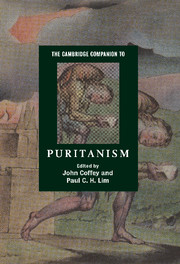Book contents
- Frontmatter
- Introduction
- Part I: English Puritanism
- Part II: Beyond England
- Part III: Major Themes
- 11 Practical divinity and spirituality
- 12 Puritan polemical divinity and doctrinal controversy
- 13 Puritans and the Church of England: historiography and ecclesiology
- 14 Radical Puritanism, c. 1558-1660
- 15 Puritan millenarianism in old and New England
- 16 The godly and popular culture
- 17 Puritanism and gender
- 18 Puritanism and literature
- Part IV: Puritanism and posterity
- Index
11 - Practical divinity and spirituality
from Part III: - Major Themes
Published online by Cambridge University Press: 28 November 2008
- Frontmatter
- Introduction
- Part I: English Puritanism
- Part II: Beyond England
- Part III: Major Themes
- 11 Practical divinity and spirituality
- 12 Puritan polemical divinity and doctrinal controversy
- 13 Puritans and the Church of England: historiography and ecclesiology
- 14 Radical Puritanism, c. 1558-1660
- 15 Puritan millenarianism in old and New England
- 16 The godly and popular culture
- 17 Puritanism and gender
- 18 Puritanism and literature
- Part IV: Puritanism and posterity
- Index
Summary
Puritans from the latter decades of the sixteenth through to the early seventeenth centuries dedicated themselves to the theological and spiritual renewal of the church in England. While Puritanism was rooted in traditional strains of English and Catholic piety, its theological shape was influenced early in the Reformation by published works of Reformed theologians on the continent and by the presence of Martin Bucer (1491-1551), a leading Reformer in Switzerland and southern Germany following the death of Ulrich Zwingli, as Regius Professor of Divinity at Cambridge University from 1549 until his death. The essential Calvinism of the Puritan movement was reinforced by the memory, kept alive by John Foxe's Actes and Monuments, of martyrdom under the Roman Catholic Queen Mary (reigned 1553-8) and exile in Frankfurt, Strasbourg and Calvin's Geneva. The English Bible translated while in exile, known as the Geneva Bible, was published (1560) with verse numbers and marginal notes that made it the most widely used Bible among Puritans even after the appearance of the Authorised Version in 1611. Fellowship with Reformed theologians in Europe, especially in the Netherlands, throughout the reign of Elizabeth I (1558-1603) further ensured that members of this English branch of the Reformed family participated fully in the international Reformed movement, intent on moving the Church of England in Calvinist directions in every way possible.
- Type
- Chapter
- Information
- The Cambridge Companion to Puritanism , pp. 191 - 205Publisher: Cambridge University PressPrint publication year: 2008
- 3
- Cited by



